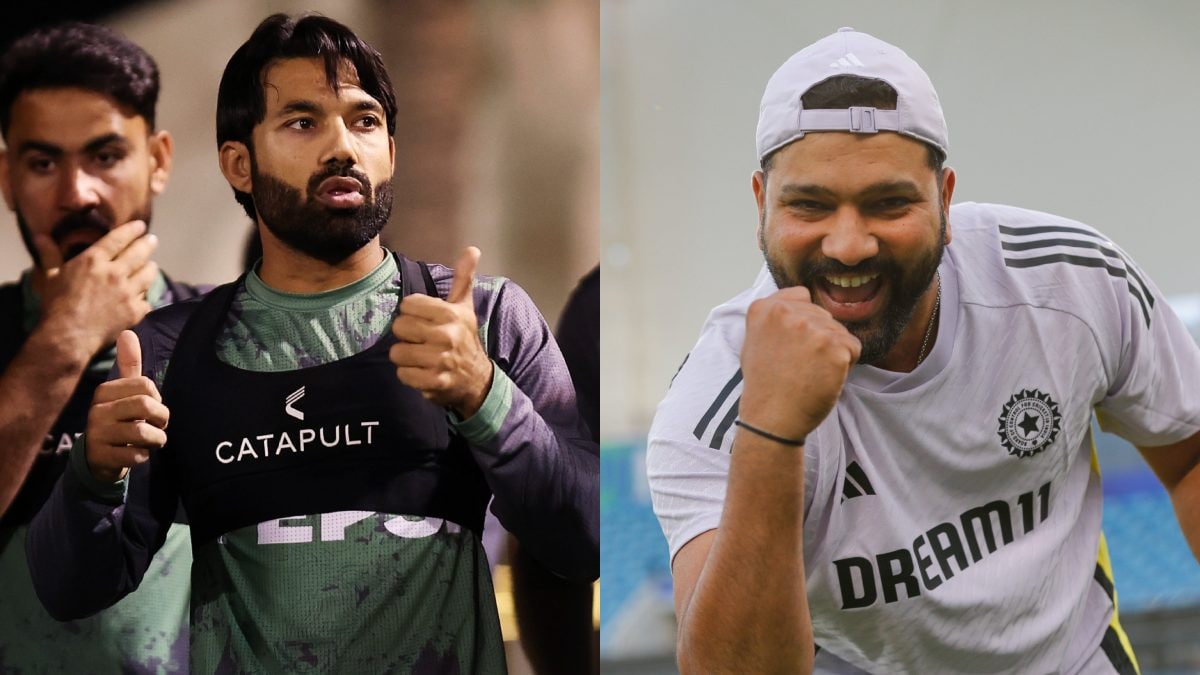
A day after arriving in Dubai from Karachi, Pakistan were hard at work at the ICC Academy grounds on Friday night. Looking at them, one wouldn’t have suspected the pressure they were under after suffering a heavy defeat in their Champions Trophy opener against New Zealand on Wednesday. There was no shortage of excitement, enthusiasm or banter and bonhomie, and if there were any nerves ahead of the ‘big one’, they were beautifully disguised.
Pakistan are on the cusp of being ushered out of their own party. After being crushed by 60 runs by the Kiwis, the tournament hosts are within one defeat of potentially playing themselves out of contention . Sunday’s blockbuster faceoff against traditional rivals India couldn’t have come at a more inopportune time; by the same token, it couldn’t also be more opportune, given Pakistan’s history of rousing themselves against India, especially in the Emirates.

Champions Trophy 2025: News | Schedule | Results | Points Table While the record between the teams in World Cups of both varieties is decidedly tilted in India’s favour – Pakistan have won just one of 16 matches between the sides in the global 50- and 20-over showpiece events combined – it’s the Pakistanis who shade their Champions Trophy rivalry by three wins to two. The last of those two wins came in the final of the previous edition of this tournament, at The Oval in London in June 2017 when Sarfaraz Khan’s men made the most of the gift of being asked to bat first on an excellent batting deck and Mohammad Amir then fired out the Indian top order. Pakistan also have great memories of playing India at the Dubai International Cricket Stadium, where they have won the last two head-to-heads – in the T20 World Cup in 2021 when they surged home by ten wickets for their only World Cup victory against India, and in the T20 Asia Cup the following year when they came through by five wickets with a ball to spare.
But evidently, they were in a different format and at a different time. Oh, and just for the record, India have won both 50-over games between the two teams at this venue, in the Asia Cup in 2018. It’s not as if being in a tight corner in an ICC event is a new development so far as Pakistan are concerned.
Take the 1992 World Cup in Australia and New Zealand, for instance. After a tepid start with just three points from their first five games, they won their last three fixtures, including against the hitherto undefeated Kiwis in their final league outing in Christchurch, on their way to the final, where they outclassed England by 22 runs. Also in Australia in 2022, in the T20 World Cup, they were without a point after two matches following defeats to India and Zimbabwe.
Not even victory in their last three matches would guarantee them a place in the semifinals but they kept up their end of the bargain and hit it lucky when Netherlands stunned South Africa to facilitate Pakistan’s progression to the last four. Eventually, it took Sam Curran’s brilliance with the ball and Ben Stokes’ industry with the bat to stop them in their tracks in the title clash. As such, all is not lost so far as Mohammad Rizwan’s men are concerned.
If they are looking for signs and coincidences, they can take heart from the fact that like Sarfaraz in 2017, another wicketkeeper-batter is at the helm this time too, though in many quarters, that might be likened to clutching at straws. Pakistan are perched at No. 3 in the ICC ODI rankings, which means they are anything but an ordinary 50-over outfit.
There is plenty of quality in both departments, but Pakistan’s problem has never been a paucity of talent. Where they have been found wanting in the past is playing to their potential on a consistent basis in the big events. They generally reserve their best for when their backs are to the wall, which they are now; for a turnaround to transpire, they must get their pace attack to wake up from self-imposed slumber and for former skipper Babar Azam and Rizwan to lead from the front with the bat.
The responsibility on Babar and Rizwan has increased exponentially in the last couple of days, with Fakhar Zaman, the explosive left-handed opener, being ruled out following an abdominal muscle injury sustained while fielding against New Zealand. Fakhar was among the primary heroes of the 2017 Champions Trophy final, lashing 114 off just 106 deliveries and striking up partnerships of 128 for the first wicket with Azhar Ali and 72 for the second with Babar to lay the platform for a terrific finish. His unavailability is a big blow that Pakistan need to quickly put out of their minds.
While Fakhar is practically irreplaceable – he averages 46.21 and strikes at 93.85 in 86 ODIs – there are enough resources otherwise at Rizwan’s command that can throw a spanner in the works.
Pakistan will likely be more worried about the diminished efficacy of their crack three-pronged pace attack of Shaheen Shah Afridi, Naseem Shah and Haris Rauf. Speedy and supremely skilled, this trio has gone off the boil somewhat in recent times; against the Kiwis earlier in the week, for instance, they returned combined figures of four for 214 from 30 overs, one of the reasons for New Zealand pulling away from 73 for three to post a commanding 320 for five. Afridi will have fond memories of playing against India at the Dubai International Cricket Stadium.
It was here that, in October 2021, the left-armer dismissed Rohit Sharma and KL Rahul within the first 13 deliveries of India’s innings to inswinging full balls, the former trapped in front and the latter bowled through the gate falling over in trying to play to leg. Cricketers, more than any other sportspersons, have long memories; Afridi will most certainly dip into his memory bank and relive those events of more than three years back, hoping to draw inspiration from those early twin strikes which played a massive part in India being kept down to 151 for seven. If the pitch for Sunday is as sluggish as it was when India bested Bangladesh by six wickets , it will negate the Pakistani quicks to a large extent but bring leg-spinner Abrar Ahmed into the picture.
Abrar will have Virat Kohli in his sights. The former India captain has fallen to leg-spin in five of his last six ODI innings in the last six and a half months and has never faced Abrar previously. If he can come through the trial by pace, we could be in for an interesting Kohli vs Abrar battle.
India’s 15-1 record against Pakistan in World Cups is as much because of their skillsets as their tendency to remain calm and unflustered in what is the biggest game of any tournament for fans across both sides of the border. To the supporters, this is not a final before the final, it is the final beyond the final. Historically, India have managed successfully to set emotion aside and approach this as just another game of cricket to the extent that that is possible.
Come Sunday, they will be quietly confident that if they play like they usually do, the odds will be in their favour, while being aware that to take any Pakistan team, especially a wounded one, lightly is to drop one’s defences and expose themselves to a decisive knockout punch..















